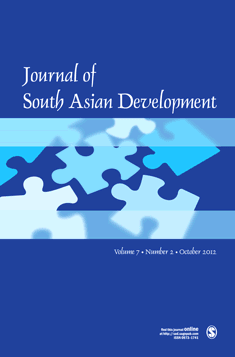
Journal of South Asian Development
Scope & Guideline
Advancing Insights into Socio-Economic Development
Introduction
Aims and Scopes
- Socioeconomic Development and Inequality:
The journal investigates the dynamics of socioeconomic development, focusing on issues of inequality, poverty, and social stratification across different South Asian contexts. - Political Economy and Governance:
It critically examines the political and economic structures that shape development policies and practices, including state capacity, governance, and the role of civil society. - Gender and Development:
A significant focus is placed on the intersection of gender with development, exploring topics such as women's empowerment, gender-based violence, and the impact of cultural norms on development outcomes. - Environmental Sustainability and Resource Management:
The journal addresses environmental challenges in South Asia, including governance of natural resources, climate change impacts, and sustainable livelihoods. - Migration and Mobility:
Research on migration patterns, including internal and international migration, labor dynamics, and the socio-economic implications of migration is a key area of inquiry. - Cultural and Ethnic Studies:
It includes explorations of cultural identities, ethnic conflicts, and the role of culture in shaping development processes in diverse communities. - Urban Studies and Informality:
The journal covers urbanization trends, informal economies, and the lived experiences of marginalized populations in urban settings.
Trending and Emerging
- Impact of Climate Change on Livelihoods:
Recent studies have increasingly focused on how climate change affects livelihood choices in vulnerable regions, highlighting the urgent need for adaptive strategies in the face of environmental challenges. - Gig Economy and Informal Work:
There is a growing emphasis on the gig economy, particularly in the context of labor rights, exploitation, and the socio-economic implications for workers in informal sectors. - Urban Marginality and Informality:
Research is increasingly addressing the experiences of marginalized populations in urban settings, exploring themes of precarity, housing rights, and informal economies. - Politics of Identity and Belonging:
Emerging discussions around citizenship, caste, and identity politics reflect a heightened interest in how these factors shape social dynamics and development outcomes. - Digital Transformation and Development:
The journal is beginning to explore the implications of digital technologies on development processes, including access to information, digital divides, and the role of technology in governance.
Declining or Waning
- Traditional Agricultural Practices:
Research on conventional agricultural methods and rural farming practices has decreased, possibly overshadowed by emerging discussions on modern agricultural technologies and climate-resilient practices. - Macro-Economic Policy Analysis:
There seems to be a waning interest in broad macroeconomic policy discussions, such as monetary policy and national economic growth, as the journal shifts towards more localized and micro-level analyses. - Historical Perspectives on Development:
The exploration of historical contexts of development in South Asia has become less frequent, indicating a move towards contemporary issues and immediate challenges faced by the region. - Health Systems Strengthening:
The focus on health systems and public health has diminished, possibly in favor of more targeted studies on specific health issues or the impact of crises like the COVID-19 pandemic. - Rural Development Programs:
There is a noticeable decline in studies specifically dedicated to rural development programs, as the journal increasingly emphasizes urban issues and migration.
Similar Journals
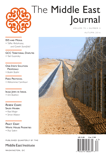
MIDDLE EAST JOURNAL
Shaping Scholarly Dialogues on Regional DynamicsThe Middle East Journal, published by the esteemed Middle East Institute, serves as a vital platform for scholarly discourse on the complexities of the Middle East, encompassing rich analyses in the fields of Sociology, Political Science, and Geography. With a legacy dating back to 1976, this journal continues to shape contemporary dialogues, offering rigorous research and insights that influence policy-making and academic studies alike. Academic readers will note its Scopus rankings, positioning it within the lower quartiles of Geography, Planning and Development and Sociology and Political Science, reflecting an opportunity for growth and increased visibility within these fields. Although the journal is not open access, it remains an essential resource for those aiming to enhance their understanding of the historical and current dynamics of the Middle East. The Middle East Journal stands as a testament to the region's complex socio-political landscape and offers a comprehensive lens for both established scholars and aspiring researchers.
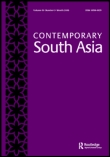
Contemporary South Asia
Illuminating Research on South Asia's DevelopmentContemporary South Asia, a peer-reviewed journal published by Routledge Journals, Taylor & Francis Ltd, stands as a critical platform for scholarly discourse in the fields of Development, Geography, and Political Science, with a notable impact factor that reflects its significance in academic circles. With a focus on the socio-political and economic dynamics of South Asia, the journal provides a rigorous forum for researchers, professionals, and students to engage with diverse perspectives and empirical studies from the region. Covering articles from 1992 to 2024, it has earned a commendable reputation as evidenced by its Q2 ranking across multiple categories in 2023 in both Development and Geography, as well as Political Science and International Relations. This journal not only hosts a plethora of insightful research but also serves as an essential resource for those seeking to understand the complexities of contemporary issues affecting South Asia. While it operates under a subscription model, the quality and relevance of the content ensure it remains a vital tool for intellectual inquiry and policy analysis in an increasingly interconnected world.
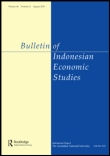
BULLETIN OF INDONESIAN ECONOMIC STUDIES
Illuminating Pathways to Economic Understanding in the RegionBULLETIN OF INDONESIAN ECONOMIC STUDIES (ISSN: 0007-4918; E-ISSN: 1472-7234) is an esteemed journal published by Routledge Journals, Taylor & Francis Ltd, based in the United Kingdom. Since its inception in 1965, this journal has played a pivotal role in advancing the understanding of economic development within Indonesia and the wider Southeast Asian region. With an impressive impact, it holds a Q1 ranking in both Development and Economics and Econometrics categories for 2023, reflecting its influential contributions to the field. The journal is highly regarded for featuring empirical research, theoretical analyses, and policy discussions, consistently ranking among the top publications in social sciences and economics—placing it in the 92nd and 90th percentiles respectively. As a vital resource for researchers, professionals, and students, the BULLETIN OF INDONESIAN ECONOMIC STUDIES provides invaluable insights into economic issues, making it essential for those aiming to grasp the complexities of economic systems in Indonesia and beyond.

Inner Asia
Exploring the Rich Tapestry of Inner AsiaInner Asia, a distinguished journal published by BRILL, serves as a vital platform for scholarly discourse in the interdisciplinary fields of Anthropology, Arts and Humanities, Development, and Geography, Planning and Development. Since its inception in 1999, this peer-reviewed journal has facilitated in-depth research and analysis of the diverse cultures, histories, and socio-economic issues pertaining to Inner Asia, contributing significantly to the comprehension of this often-overlooked region. Although it currently operates without open access, the journal is committed to rigorous academic standards, as evidenced by its recent rankings—placing within the Q3 and Q4 categories across multiple relevant disciplines, denoting its solid reputation among global academic circles. Researchers, professionals, and students alike rely on its comprehensive studies to inform their work and expand their understanding of the complexities of Inner Asia, ultimately fostering greater interdisciplinary dialogue and collaboration.
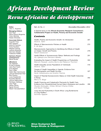
AFRICAN DEVELOPMENT REVIEW-REVUE AFRICAINE DE DEVELOPPEMENT
Empowering Sustainable Futures in AfricaAFRICAN DEVELOPMENT REVIEW - REVUE AFRICAINE DE DEVELOPPEMENT is a premier academic journal dedicated to the field of development studies, published by Wiley. With a focus on the complex dynamics of sustainable development on the African continent, this journal aims to disseminate high-quality research that informs policy and scholarly discourse. Established in 1989, it has consistently maintained its reputation, ranking in the Q1 category for development in 2023, and achieving an impressive 85th percentile rank in the Scopus Social Sciences category. Although it does not currently offer open access, the journal provides a vital platform for researchers, practitioners, and students to explore innovative ideas and interventions aimed at addressing Africa's development challenges. The journal's ISSN is 1017-6772 and its E-ISSN is 1467-8268, reflecting its commitment to providing a scholarly outlet for rigorous analysis and dialogue. For the latest insights and developments, the AFRICAN DEVELOPMENT REVIEW remains an essential resource, fostering a deeper understanding of the trajectories shaping African nations into the future.
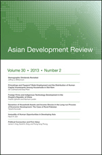
Asian Development Review
Empowering Change through Open Access ScholarshipThe Asian Development Review, published by World Scientific Publishing Co Pte Ltd, is a distinguished journal that has been at the forefront of scholarly discourse in the fields of development, economics, and geography since its inception in 1987. With an Open Access model adopted in 2013, this journal strives to enhance the accessibility of high-quality research, facilitating a broader dissemination of vital knowledge and insights that address pressing socio-economic challenges across the Asian landscape. The journal is classified in the Q2 Quartile category for 2023 in Development, Economics and Econometrics, as well as Geography, Planning, and Development, reflecting its substantial contribution to these fields. The journal also holds respectable rankings in Scopus, placing it in the top 45-55th percentile across various disciplines. Researchers, professionals, and students are encouraged to explore the wealth of research and methodologies presented in this impactful publication, which not only seeks to illuminate current issues but also aims to inform policy and practice across the Asian region.
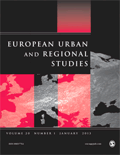
EUROPEAN URBAN AND REGIONAL STUDIES
Pioneering Research in Urban and Regional TransformationEUROPEAN URBAN AND REGIONAL STUDIES is a premier journal dedicated to advancing the field of urban and regional studies, published by SAGE PUBLICATIONS LTD, a distinguished publisher renowned for its contributions to scholarly communications. Established in 1994 and running through 2024, this journal provides a vital platform for interdisciplinary research that addresses the complexities of urban environments and regional developments across Europe and beyond. It holds impressive distinctions, ranking in the Q1 category for both Environmental Science and Urban Studies in 2023, reflecting its strong impact and influence—ranked #31 out of 279 and #42 out of 219 in Scopus, respectively. Scholars and practitioners seeking to contribute to or stay informed on trends in sustainable urban development, policy-making, and regional planning will find this journal indispensable. Its contributions not only shed light on pressing urban issues but also cultivate a dialogue that bridges theory and practice. Enhance your understanding of contemporary urban challenges by engaging with the rich tapestry of research published in this esteemed journal.

Asian Women
Exploring Gender Dynamics Across Asia.Asian Women is a distinguished journal dedicated to the exploration and discourse surrounding the multifaceted experiences and roles of women in Asian societies. Published by SOOKMYUNG WOMENS UNIV in South Korea, this journal provides a critical platform for researchers, professionals, and students to engage with contemporary gender studies, sociology, and political science from 2008 through 2024. With an ISSN of 1225-925X and an E-ISSN of 2586-5714, Asian Women aims to foster scholarly conversation and promote understanding of the issues impacting women's lives across diverse Asian contexts. Although currently classified within the Q4 quartile for Gender Studies and Sociology and Political Science as per the 2023 category rankings, the journal serves as an invaluable resource for those looking to dive deep into gender dynamics, cultural studies, and social justice issues. By contributing to the growing body of literature, Asian Women plays a pivotal role in advancing knowledge and shaping policies related to gender equity in Asia.
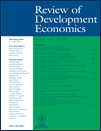
Review of Development Economics
Advancing knowledge for impactful economic strategies.The Review of Development Economics, published by WILEY, stands as a significant scholarly journal dedicated to the field of development economics. With an ISSN of 1363-6669 and an E-ISSN of 1467-9361, this journal not only addresses critical economic issues but also explores their geographical and planning aspects, categorizing itself in the Q2 quartile for both Development and Geography, Planning and Development as of 2023. The journal, established in 1997 and continuing to date, emphasizes original research and integrative perspectives that are pivotal for policy-makers, academics, and students. With a Scopus rank of #104 in Development and #286 in Geography, it represents a valuable forum for discussing impactful development strategies amidst global challenges. While currently not offering Open Access, the journal ensures comprehensive coverage of developmental studies and encourages submissions that aim to advance both theoretical frameworks and practical applications, all while fostering a deeper understanding of effective development practices in a rapidly changing world.

Asian Journal of Social Science
Illuminating Asia's Social Landscape Through ResearchAsian Journal of Social Science, published by Elsevier, serves as a vital platform for researchers and scholars interested in the diverse realms of social sciences. With a history dating back to 1973 and recurrently publishing from 2000 to 2024, this journal reflects the evolving landscape of social inquiry in Asia and beyond. The journal currently holds a respectable Q3 ranking in the category of Social Sciences (miscellaneous) and ranks #141 out of 275 in the Scopus rankings for General Social Sciences, indicating its growing influence and relevance in the academic community. Although not an open-access journal, its commitment to high-quality, peer-reviewed scholarship ensures that contributions from a wide array of disciplines are readily accessible to a global audience. By fostering interdisciplinary dialogue and disseminating innovative research, the Asian Journal of Social Science plays a crucial role in advancing understanding of social phenomena, making it an essential resource for researchers, professionals, and students alike.